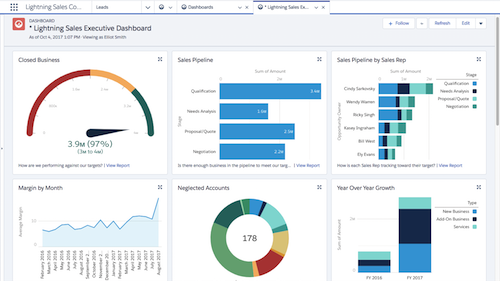Janna Safran, Communications Specialist, JMO Communications
Jennifer Orford, Founder & CEO, JMO Communications
Like most start-ups and small businesses in the beginning, our data was sprawled across desks, multiple Excel spreadsheets, and on color-coordinated sticky notes. While this system worked initially, it was not sustainable or conducive to growth.
Solution: Invest in customer relationship management (CRM) technology to streamline processes and organize client and prospective client data – with the ultimate goal of improved business relationships and increased profits.
What is a CRM?
A CRM helps manage a company’s relationship and interactions with clients and prospective clients.
(Screenshot from: https://www.salesforce.com/content/blogs/us/en/2019/01/sales-management-dashboards.html )

Why use a CRM?
- Save time and money
It is simple: more time spent on administration means less time for client work.
A CRM should be used by the team as a common platform to manage all client interactions, track deadlines, set reminders for follow ups, and help prioritize competing needs. Furthermore, a CRM can create data visualizations to further highlight patterns of behaviors, financial queries, and create customizable client-specific reports.
Cost-reducing benefits of a CRM[1] include:
- Quick and easy to implement
- Cloud-based system (no special hardware to install, automatic software updates, remote-based system)
- Priced on number of users and feature access (you only pay for what you need)
- Extremely flexible (scale up and add more users/features as your business grows)
- Increase communication, productivity and efficiency
As your business grows, it is important that information is documented and easily accessible by colleagues. Within a CRM, everyone can view client history (finances, interactions, projects), status of current projects, outstanding issues, customizable information such as geographic location, and other information that helps garner connectivity. For JMO Communications, Salesforce optimizes our communication and business strategy by producing a data-driven approach to forecast potential clients, upcoming deadlines, and project closures more accurately. With all data in one location – and access to it from anywhere in the world – CRMs are an effective tool for global collaboration.
- Personalization matters
When we want something, we are more likely to return to our favorite brands than to try something new. Why? Because we trust them. Our favorite brands make us feel understood and appreciated.
This same concept applies to business. Clients are more likely to engage with and return to companies that they trust. According to Forbes, “… companies that grow faster drive 40% more of their revenue from personalization.” Clients that feel supported and understood are happy. Happy clients result in repeat clients and increased revenue.
CRMs can track client information such as birthdays, geographic locations, big life events, and more. Although these details may be easily forgotten, CRMs can provide reminders, helping ensure these micro-moments aren’t forgotten – illustrating your commitment to the client and fostering long-term relationships.
How has a CRM transformed JMO Communications?
- Increased efficiency
- Enhanced client relationships
- Strengthened collaboration
- Streamlined processes
“Salesforce has revolutionized the way our small business functions. I feel confident knowing that this platform will continue to grow and support us for many years to come.”
– Jennifer Orford, Founder & CEO
———————————
About JMO Communications
JMO Communications is an SBA-certified 8(a) woman-owned small business with a global track record of success. Our passionate team is composed of 50+ communications and learning experts in 11 countries. We mobilize the right people with the right skills to deliver not only on time and within budget, but also to exceed your expectations. Our team has proven success on delivering both large and small projects for US government-funded organizations, United Nations agencies, international non-profits, for-profit private companies, and foundations.
Areas of expertise: Data visualization and graphic design; editing and writing; knowledge management; media management; project identity and branding; social media management; strategic communications; training and capacity building; translation and localization; videography, animation, and field-based photography; and website design and development.
- Based on Salesforce ?





